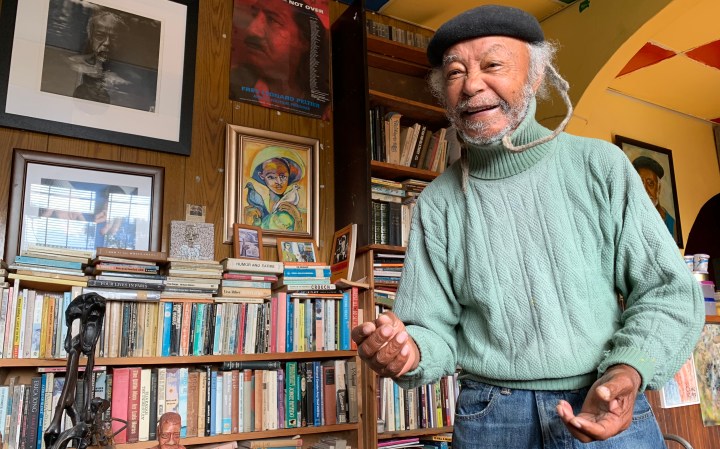PEOPLE'S HISTORY
A living tribute to James Matthews, writer and man of the people

The life and work of the writer was celebrated during the second Van Toeka Af Living Legends Recognition Series, held in Cape Town on 17 June 2022.
There are many stories to be told about James Matthews, the writer. One of the more beguiling ones is the one he often tells about receiving a copy of his first book, Azikwelwa.
He went to collect the overseas package at the post office, sat down on the pavement, unwrapped it, paged through it while inhaling the ink residue from every page, and admired the author’s photograph. The year was 1962. Matthews was 33 years old, and he had been writing for close on 16 years. This was his first book, a book with his name on it.
Every published writer knows that special moment, when you eventually see your writing in print, having evolved from an aspirant writer to a published one. It is a haloed moment to be savoured.
As Matthews tells the story, he went to a bottle store close by and bought a bottle of beer, which he shared with a street sweeper. The man could not believe his luck, but happily shared in the moment, even if at first incredulously, when Matthews told him that he had just received a copy of his own book. I can imagine his new drinking pal quizzically asking, “Issit, my bra?” (Is it, bro?). Matthews apparently had to convince him by showing him the author’s photograph.
The publication of Azikwelwa, and the event of Matthews’s reaction to it, are significant for several reasons. First, you would have noticed that I said nothing about reading. Besides the title and the author’s name, Matthews could not read a single sentence in his own book, because it was a translation. The publisher was Bo Cavefors, situated in Malmö, Sweden.
Obviously, he knew what was supposed to be printed, but he could not verify a single Swedish sentence in his own book. This mere fact tells us a lot about the politics of publishing, the reception of local readers or the lack thereof, South African writing and particularly black South African writing. The possibilities of publication in this country were limited, more so for black writers. In the main these writers’ access to their potential local readers was cut off.
Matthews’s first stories appeared in newspapers like The Sun, edited by George Golding, the Golden City Post and the Cape Argus, and magazines such as Hi-Note and Drum. Besides the general newspaper readership, further literary recognition came his way when his stories were published in Richard Rive’s anthology, Quartet: New Voices from South Africa (1963). Again, this important collection of 16 stories, four stories each by the four authors, was published abroad and reprinted several times, among them as book number 14 in the Heinemann African Writers Series. Besides the stories of Matthews and Rive, the collection also included stories by Alex La Guma and Alf Wannenburgh.
For much of his earlier career, James Matthews the writer would be better known in Sweden and Germany, and elsewhere in the literary world, than in SA. It is therefore no surprise that for years he could not get a passport to travel internationally.
On the spur of the moment, Matthews chooses to share his exhilaration with a street sweeper. This is a second significant feature. The act in itself speaks of his spontaneity, but also of his situatedness, the common cause he makes with people outside creative or artistic circles. James is very much – in the positive sense of the word – a man of the people, a trait that would mark his writing, his daily interactions and his consistent commitment to the common good.
Third, Azikwelwa appeared with a collection of sketches by Peter Clarke, among the first of their many artistic collaborations and a friendship that lasted a lifetime.
The fourth element of significance I read into the publication of the debut collection is that the title short story, Azikwelwa, references the 1957 Alexandra bus boycott, when the bus company hiked its fares and the local commuters refused to use their service until the prices were dropped. “We will not ride!” was the call – “Azikwelwa!” The story is Matthews’s most succint early expression of political solidarity across the divides that colonial and apartheid regimes had legislated in the country.
This collection appeared at a time of accelerated statutory social division and repression in the country. South Africans experienced the introduction of the foundational apartheid enactments, the Sharpeville massacre, the banning of resistance organisations and the introduction of reshaped censorship laws. In a very real sense, nascent black South African writing was banned as soon as it was published. Among these were the writings of Matthews’s fellow writers, Alex La Guma and Richard Rive. The consequence of an act of banishment is not only the broadly defined repression of free speech or the destruction of a culture. It is in a particular sense the silencing of writers’ voices.
In 1972 Matthews, along with Gladys Thomas, published Cry Rage!, his first book of poetry. It was promptly banned in 1973. The next year, he edited the anthology Black Voices Shout! (1974). Again it was banned. Later his collection Pass me a Meatball, Jones (1977), published after his first spell of detention in Victor Verster Prison in 1976, suffered the same fate.
In all these instances, Matthews refused to appeal the banning orders, for in his words, “to have appealed […] meant that I placed myself subservient to a race-besotted government”. If the government thought they could silence his voice, lessening his influence, they had another thing coming. He would not be silenced or cowed.
A final detail of the Azikwelwa moment is that it shows up the inaccessibility and dearth of local publishing, especially for black writers. Matthews stepped into the breach, establishing BLAC, his publishing house that would forthwith mostly publish his own anthologies. BLAC is the acronym for Black Literature Arts and Culture, directly relating its establishment to the rise of Black Consciousness in the late 1960s and the 1970s. There are a number of features of Black Consciousness that are relevant here, namely the active subversion of ruling forms of social organisation, eg not adhering to apartheid’s divisions, seeking self-definition that supersedes biological traits and defining blackness as an overarching symbol of resistance. Throughout his writing career, Matthews espoused along with this sense of self-affirmation a sense of steely self-determination and a sense of self-reliance to act in his and others’ self-betterment.
Matthews is a prime example of the poet as chronicler of a people’s history. One can read in his poetry the development of our society over the years, and the struggles people waged against race classification and exclusion, poverty and unemployment, and violence and repression. He continues to be a sentinel against corruption, violence and the creeping signs of new forms of social marginalisation.
I am delighted that the Department of Sport, Arts and Culture has chosen to celebrate the writing, cultural and social activism, and the legacy of James Matthews, the writer and publisher. The writer who many years ago shared a beer with a street sweeper has found contentment in old age. In Age is a Beautiful Phase (2008), he writes:
i continued my passage
to find myself positioned
polishing my string of
beads reflecting the
stops in my travels
assured that age is a cause for celebration.
DM168
This story first appeared in our weekly Daily Maverick 168 newspaper, which is available countrywide for R25.




















 Become an Insider
Become an Insider
Comments - Please login in order to comment.